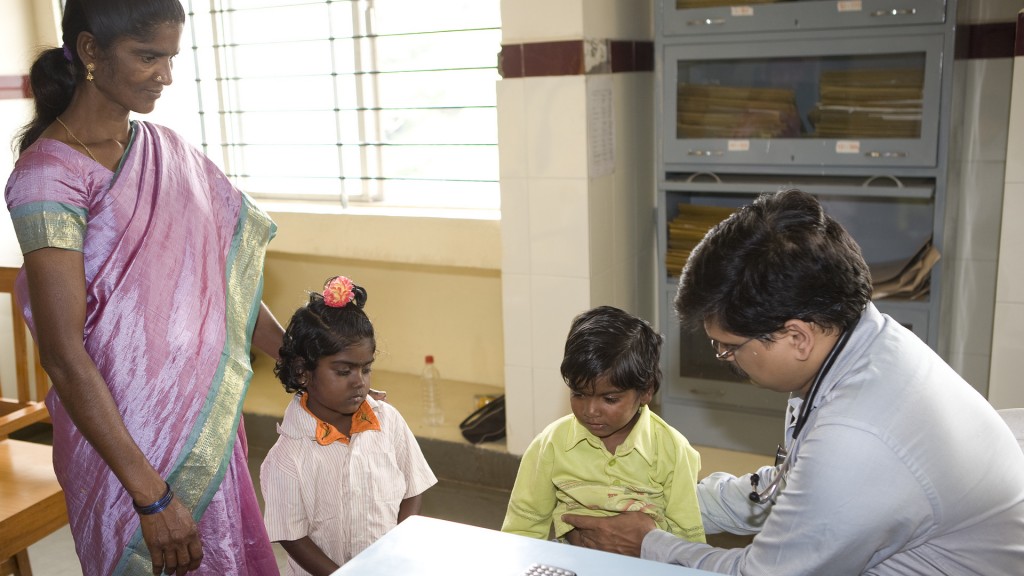
A doctor examines a child in India. Image: FLICKR/Clinton Foundation
Tuberculosis (TB) is a contagious disease caused by bacteria that usually affects the lungs, but sometimes can also affect other parts of the body such as the spine, kidneys or brain. Until a few years ago there were medicines that worked very well against TB, but now there are forms of the TB bacteria that are resistant to drugs. This is very worrisome because it may not be possible to cure TB.
The World Health Organization (WHO) estimates that 2 billion people are infected with TB, meaning that they have the bacteria in their bodies, but only some of them actually get sick and develop symptoms. Most of the people who have a TB infection but are not sick are said to have Latent TB, and they are also not contagious. Those who do show symptoms are said to have Active TB, or TB disease, and they can spread the disease to others.
Between 2008 and 2013 approximately 1.4 to 1.5 million people in India developed active TB each year. While the number of cases has been falling slightly, the mortality rate, or portion of people with TB disease who did not recover and died from the disease, has been slowly rising. This is very likely due to the increase of drug-resistant TB.
Symptoms
Most people who develop TB are infected in their lungs and show the following symptoms:
- a bad cough that lasts three or more weeks
- pain in the chest
- coughing up blood or sputum (a mix of saliva and mucous)
- drenching night sweats
- weakness or fatigue
- unexplained weight loss
- lack of appetite
- chills and/or fever
If the infection occurs in other parts of the body, the symptoms vary depending on which organs are affected. Blood in the urine may indicate a kidney infection, while back pain may indicate a spinal infection. The occurrence of TB in other areas of the body besides the lungs is on the rise in India.
If a person has any of these symptoms they should be seen by a doctor, who can determine whether they are the result of other causes. There are several tests that doctors can perform to check for TB disease. The doctor may recommend a skin test, a chest x-ray, CT scan or lab test of blood or sputum if it seems necessary to confirm a TB infection.
Prevention
TB spreads from a person with active TB to other persons around them through the air. If a person who has TB is infected in the lungs or throat and coughs, sneezes, laughs, spits, speaks or sings, then they will spread the TB germs into the air. Anyone nearby who breathes in the germs then is at risk of getting sick as well.
Family members or others who are often near someone with TB are more likely to catch the infection. To lessen the spread, the person with TB should stay home, stay away from other family members or wear a surgical mask when around other people. Good ventilation is important to get the germs out of the house.
It is also possible to catch bacteria that cause TB from raw (unheated or unpasteurized) milk from cows, buffalo, sheep, goats or other animals, and products made from raw milk, including yogurt (dahi) and cheese (paneer). If milk has not been pasteurized, it should be boiled before being consumed.
While nearly 1 out of 3 people has TB germs in their body, for most of them their immune system is able to fight the germs and keep the persons from getting sick. People whose immune systems are weakened are more likely to get sick. People who have HIV/AIDS or who smoke are at a very high risk of developing TB. Other illnesses, such as diabetes, and a previous illness due to TB, alcohol abuse and other illegal drugs also increase the risks of getting TB.
Treatment
Special antibiotics are used to cure TB and often it may take more than just one medication. A person diagnosed with TB should only take the medications prescribed by a doctor. In addition, the treatment for TB is very long and can take 6 to 9 months. Even though a person with TB may start to feel better after a few weeks, it is very important to take the medication for the entire time that the doctor prescribed.
Taking the wrong medications or stopping medications too early can leave a few resistant bacteria alive, which can then grow and make the person sick again. This is a real problem that has been increasing in many countries, especially India. Sometimes a health-care worker is assigned to make sure that a TB patient is continuing to take their medications. This is for the good of the patient and the community.
Vaccination
A vaccination called Bacille Calmette-Guérin (BCG) may be given to prevent TB disease. The Indian Academy of Pediatrics recommends that this vaccine be given at birth, or at any time up to 5 years of age. The vaccine is not considered to be very effective in adults, and it may not always prevent TB disease in children either.
If you appreciate articles like this, please like our page on Facebook to let us know and so that others may also discover us.
Disclaimer: Medical content and advice published on this site is provided for information purposes only and is not a substitute for a consultation with a licensed physician or the reader’s discretion. Although FamiLife.in verifies all information with reputable sources, the contributors and publishers accept no responsibility for any actions taken by readers based on the information provided here. FamiLife.in recommends that you always consult a licensed medical professional in health matters.
